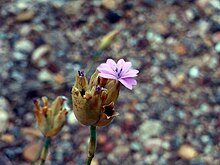Petrorhagia nanteuilii
Appearance
| Petrorhagia nanteuilii | |
|---|---|

| |
| Scientific classification | |
| Kingdom: | Plantae |
| Clade: | Tracheophytes |
| Clade: | Angiosperms |
| Clade: | Eudicots |
| Order: | Caryophyllales |
| Family: | Caryophyllaceae |
| Genus: | Petrorhagia |
| Species: | P. nanteuilii
|
| Binomial name | |
| Petrorhagia nanteuilii | |
Petrorhagia nanteuilii is a species of flowering plant in the family Caryophyllaceae.[1] Common names include childing pink,[2] productive carnation, proliferous pink and wild carnation.[3] P. nanteuilii in the British Isles was formerly not reliably separated from P. prolifera but now the two are recorded as separate species.[4] Because of this the commonly used name proliferous pink is probably not correct for this taxon. It is an annual that grows to 50 cm tall. Leaves are linear, opposite and stem clasping. Small pink flowers are produced in small ovoid heads, with usually only one flower visible at a time. These are followed by ovoid seed capsules.[5]
The species is native to Europe but has become naturalised elsewhere.[3]
References
[edit]Wikimedia Commons has media related to Petrorhagia nanteuilii.
- ^ "Petrorhagia nanteuilii". Australian Plant Name Index (APNI), IBIS database. Centre for Plant Biodiversity Research, Australian Government, Canberra. Retrieved 12 June 2012.
- ^ BSBI List 2007 (xls). Botanical Society of Britain and Ireland. Archived from the original (xls) on 2015-06-26. Retrieved 2014-10-17.
- ^ a b "Petrorhagia nanteuilii". Germplasm Resources Information Network. Agricultural Research Service, United States Department of Agriculture. Retrieved 12 June 2012.
- ^ "Petrorhagia nanteuilii | Online Atlas of the British and Irish Flora".
- ^ Wild Plants of Victoria (database). Viridans Biological Databases & Department of Sustainability and Environment. 2009.
